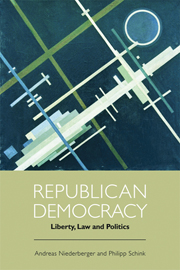Book contents
- Frontmatter
- Contents
- List of contributors
- Introduction
- 1 The Tension between Law and Politics in the Modern Republican Tradition
- 2 Impotence, Perspicuity and the Rule of Law: James Madison's Critique of Republican Legislation
- 3 Kant, Madison and the Problem of Transnational Order: Popular Sovereignty in Multilevel Systems
- 4 Republicanism and Democracy
- 5 Two Views of the City: Republicanism and Law
- 6 A Kantian Republican Conception of Justice as Nondomination
- 7 Two Republican Traditions
- 8 Freedom, Control and the State
- 9 Legal Modes and Democratic Citizens in Republican Theory
- 10 Rights, Republicanism and Democracy
- 11 Republicanism and Global Justice: A Sketch
- 12 Republicanism and Transnational Democracy
- Index
12 - Republicanism and Transnational Democracy
Published online by Cambridge University Press: 05 October 2013
- Frontmatter
- Contents
- List of contributors
- Introduction
- 1 The Tension between Law and Politics in the Modern Republican Tradition
- 2 Impotence, Perspicuity and the Rule of Law: James Madison's Critique of Republican Legislation
- 3 Kant, Madison and the Problem of Transnational Order: Popular Sovereignty in Multilevel Systems
- 4 Republicanism and Democracy
- 5 Two Views of the City: Republicanism and Law
- 6 A Kantian Republican Conception of Justice as Nondomination
- 7 Two Republican Traditions
- 8 Freedom, Control and the State
- 9 Legal Modes and Democratic Citizens in Republican Theory
- 10 Rights, Republicanism and Democracy
- 11 Republicanism and Global Justice: A Sketch
- 12 Republicanism and Transnational Democracy
- Index
Summary
The past ten years have seen a host of new publications examining the significance of the republican tradition for international relations and a cosmopolitan political philosophy (for example, Bohman 2007; Deudney 2007; Onuf 1998; Pettit 2010a), a development that is paralleled by a renewed interest in republicanism among historians of ideas (for example, Skinner 1998; van Gelderen and Skinner 2002; Pocock 2003) and political philosophers (for example, Pettit 1997; Viroli 2002). It seems clear now that the problem of legitimate international organizations and, more generally, of legitimate transnational political arrangements must be defined as a tension between two claims. First, such institutions are necessary to ensure that states or nonstate international agents (such as multinational corporations or nongovernmental organizations) do not dominate other states or communities whose states cannot properly shield them from such encroachments. But second, international organizations and institutions in themselves also present a danger to freedom: this requires a response if we are not to be left with an infinite regress of yet more comprehensive institutions. This article argues that the premises of republican theory necessitate a rejection of common conceptions of a legitimate international order (such as a free association of individual states or a world state). A more precise understanding of these premises will enable us to formulate an alternative definition of a legitimate global order.
- Type
- Chapter
- Information
- Republican DemocracyLiberty, Law and Politics, pp. 302 - 327Publisher: Edinburgh University PressPrint publication year: 2013

